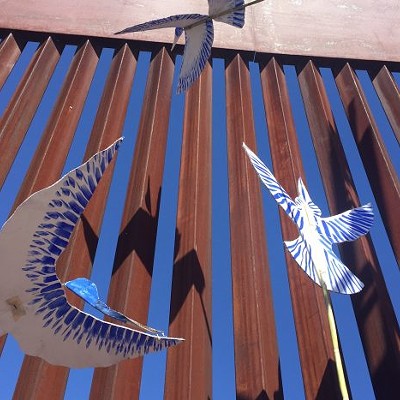Journalist Linda Valdez is known for her Arizona Republic editorials shedding light on Arizona's crazy-land immigration politics. Her work made her an editorial-writing finalist for the Pulitzer Prize in 2003 and in 2011 she won the Scripps Howard Walker Stone Award. Before joining the Republic in 1993, Valdez worked for the Arizona Daily Star writing about immigration and border issues. In 1988, she met Sixto Valdez in Mexico and fell in love. Her second book, Crossing the Line: A Marriage Across Borders, is a story about their love and how the immigration system failed them, forcing Sixto, like thousands of others, to cross the border illegally. You can hear more about the book, published in October by Texas Christian University, at a reading on Friday, Feb. 19 at Antigone Books, 411 N. Fourth Ave., 7 p.m.
As a journalist, did you ever feel uneasy telling such a personal story about your life and marriage?
Yes, it did. It was a big step out of my comfort zone, but the reason I wanted to do it, is that there is so much ugly rhetoric about immigration and so many stereotypes. I had a unique perspective and felt that the world could benefit from my story. It is a love story, but also a story of what I learned about Mexico and the Mexican culture by marrying into it.
Did you worry that you'd be accused of having a conflict since you often write about immigration?
I had actually been writing about immigration at the Star before I met Sixto. It informed me further to have that personal connection and that greater insight. I don't think there's any kind of conflict there. A lot of people have intimate knowledge about what they write about and it makes them better writers.
Was it frustrating going through the immigration process with Sixto?
It was particularly frustrating because I was a journalist and had covered these issues. I figured I could work the system and call the right people to get the information I needed. He did not want to come across illegally. We went through the steps he was told to make. It was very frustrating for me personally and as a journalist. I thought I was following process. There was no reason to not give him a visa, except he was a young man from Mexico. I felt my country was betraying me and that the system doesn't work. When people say that people should come, but come the right way—it's a fallacy.
Was it a culture shock visiting Sixto's family for the first time in Mexico, being an Ohio girl?
It was a culture shock the first time I went there to meet his family. I was not prepared. I lived in Arizona some years before, but my roots were in middle class Ohio. I never knew anyone in a home with a dirt floor or an outhouse. They didn't have a lot of money, but didn't seem poor. I didn't speak much of the language when I first got there. What struck me the most was that he was so beloved in that community and they were so happy to see him back. It struck me then how much he left behind when he came to the United States. People who come here from someplace else, they leave a lot behind. There's a big stereotype that everything they find here is better than what they left behind.
How has the book been received?
Most people have really liked it. I was a little bit worried that there would be a negative response, but there hasn't been and I hope it stays that way. I've been surprised that people are as open as they are and seemed genuinely touched. This is all about stories about my family, his family, and the blending the cultures. It really is what the border should be about—a place to meet and exchange ideas. What we've done is turn it into a militarized zone and separate people.
Anything else you'd like to add?
I just want to say, the United States is caught up on all this political rhetoric, but we have nothing to fear. They aren't coming here to do us harm. They are real people and have real contributions to make. In the back of my book, Terry Goddard says that Donald Trump should read my book. We are all sharing this world together. Mexico is our neighbor and we are not being very neighborly.
An excerpt from Crossing the Line: A Marriage Across Borders:
The bus bucked as the driver downshifted. I staggered toward the front door as Sixto followed, juggling the bags and urging me to be careful. We stopped. The door opened and I picked my way down the steps. Sixto followed, taking a long time to properly thank the driver, who had pulled up right in front of Doña Sole's house to let us off.
There was a shallow, weedy ditch between the road and a three-strand barbed-wire fence. Through an opening in that fence I could see a dirt yard and rosebushes covered in enormous flowers of all colors: red, pink, orange, and yellow. Towering over them were trees with leathery leaves and green fruit that looked like elongated baseballs. They were mango trees, but I didn't know that then. Nor did I recognize the giant avocado tree that was part of the canopy high overhead. How different from those little houseplants my mother and I had coaxed from seeds held by toothpicks over jars of water.
The blue sky through the leaves, the sun: these things were the same. But everything under those trees was new to me as we walked up a pathway toward the house.
Doña Sole's new house was only partially finished then; construction would resume when money was available to buy materials and labor. The walls were adobe block between supports of concrete beams. The roof was a slab of concrete. There were open rectangles where the door and windows would one day be installed.
"¡Mamá!" Sixto called out.
Two women rushed through the doorway and another jumped through an opening for a window. The one who came through the window was yelling "¡Sixtito!" But she was too young to be his mother.
They were all rushing toward us. But which one was my mother-in-law? Sixto dropped the bags and rushed into the embrace of all three. The ladies wept and exclaimed and hugged Sixto, dried their eyes on their sleeves or dish towels, and hugged Sixto again. They looked at me. I had no idea what to do.
Sixto looked toward the house and called out again "¡Mamá!"
There she was. Doña Sole was a head shorter than my husband, solid, but not fat, with long grey hair pulled into a ponytail at the base of her neck. Her cotton dress had a pattern of tiny pink flowers. My grandmother would have called it a housedress. But instead of the heavy lace-up shoes my grandmother would have worn with thick stockings, Doña Sole wore plastic flip-flops. She stood in the doorway, wiping her hands on a frayed kitchen towel that hung over her shoulder.
He ran to her and she fell into Sixto's arms and began weeping. This was exponentially more intense than the greetings from the other women. This time, the world stopped. As they embraced, she wept and exclaimed things like "¡Gracias a Dios!" and "¡Mijo!" Sixto wept, too, and said things back to the top of her head, which was buried in his chest.
After what seemed like a very long time, the earth began to revolve around the sun again. Kids ran from behind the house. More voices could be heard exclaiming my husband's name. A big truck chugged down the highway, followed by another bus, its gears protesting the sudden downshift at the speed bump.
Sixto reached out to me over his mother's shoulder, still weeping. The other ladies shepherded me forward. When I got close enough, he pulled me into their embrace. It was a tight hug, and all I could do was hold on.
I tried to return the intensity of their moment. But I was unaccustomed to such raw emotion. It washed over me, but did not sweep me away. My eyes stayed dry, and I felt a twinge of guilt about that. In a few moments, the hug loosened and I stepped back. Doña Sole looked at me and said something I didn't understand. I smiled.
Then she pulled me into a hug that included just the two of us. There was more weeping, more exclamations. When I got the chance, I smiled again and nodded at her. She seemed entirely satisfied, and we began another round of hugging.
I had not said one word, but I'd been accepted.
From that moment on, whatever I did—whatever harebrained, outlandish, North American request I might have—was just fine with Sixto's mother. I was part of her family and under her protection, as surely as a chick under the wing of its mother hen.
It took a long time to sort out everybody else. As Sixto introduced me, I did my best to grab names and hold on. But he would get pulled away by this person and that person, and I got lost in the labyrinth of relationships. Siblings. Spouses of siblings. Children of siblings. Neighbors.
One of the older ladies who'd been first out the door was Doña Mariyita. She lived next door and shared coffee with my mother-in-law every afternoon under the mango trees.
The woman who jumped through the window shouting "¡Sixtito!" was Emilia, Doña Sole's youngest daughter. Emilia and her toddler daughter were living with Doña Sole, but Emilia spent much of her time out with a woman friend, leaving the baby, Anayetzi, to Doña Sole's care.
Toñita, whose house we had passed in Cohuibampo on the way in, had exited the house in a typically more dignified manner after their mother and Sixto were embracing. It was clear even then that Toñita would inherit the mantle of family matriarch, even though she was not the oldest daughter. She had gravitas. Doña Sole cited her opinions often and with finality. If Toñita said it, you'd better listen.
Several of Toñita's five children flocked around the house with the other nieces and nephews.
Sixto's older brother Trini and his wife Nelly were also there to greet us. They had a young son and twin baby boys.
There were other people—matriarchs and children. I was still trying to keep them straight when Doña Sole ushered us into the house for something to eat. They'd been cooking all day.
Sixto wanted to give me the grand tour first, and show me where we could wash the travelers' dirt off our hands.
Doña Sole's house was a complex of structures. The doorless entry of the new house led to a living room that was dominated by a large dining table with chrome legs sticking out from under a flowered plastic tablecloth. A bare light bulb hung from wires tacked to the ceiling. That room opened into the kitchen, which had an old wooden worktable, a set of unpainted wooden shelves, and a tiny white enamel stove. A pipe ran through a hole in the wall and linked the stove to a big butane tank outside.
Two small bedrooms opened off the side of the living room, with curtains hanging in the doorways. In the daytime, those curtains were scrunched together and hooked over nails so the air could circulate. At night—or if somebody was changing—they were pulled closed to provide privacy. Doña Sole slept in one room, which had another small room attached. This is where she planned to put a bathroom—just as soon as running water and a sewer were available. Emilia and her daughter slept in the other bedroom.
Sixto's youngest brother, Luis, also lived at home, but he wasn't there that day. He had a job at the Hotel Santa Anita in Los Mochis, the graceful hotel where the gringo travelers took refuge after the Great Bus Robbery. It was a good job, but even a good job in Mexico didn't pay much. Doña Sole said Luis was restless and thinking about checking out life on el otro lado.
Luis slept in the old house, which was just a few feet outside the back door of the new house. This is where Sixto grew up, and he was excited about showing it to me. The walls were made of cactus ribs and mud; the roof was corrugated metal tacked down with nails hammered through bottle caps. Sixto said the bottle caps helped prevent leaks. He was proud of this old structure, where he and eleven of his siblings had been born and all fourteen children had been raised.
Sixto's father had built the old house, but everyone helped maintain it.
As a child, Sixto would help Toñita rub the walls and dirt floors with water, turning the clay-laden dirt into slurry that dried hard and smooth. It created a surface firm enough to sweep—lightly. If you applied too much pressure, the shell would break and the dirt became powdery. This is something I learned from experience; the new house had dirt floors for years.









